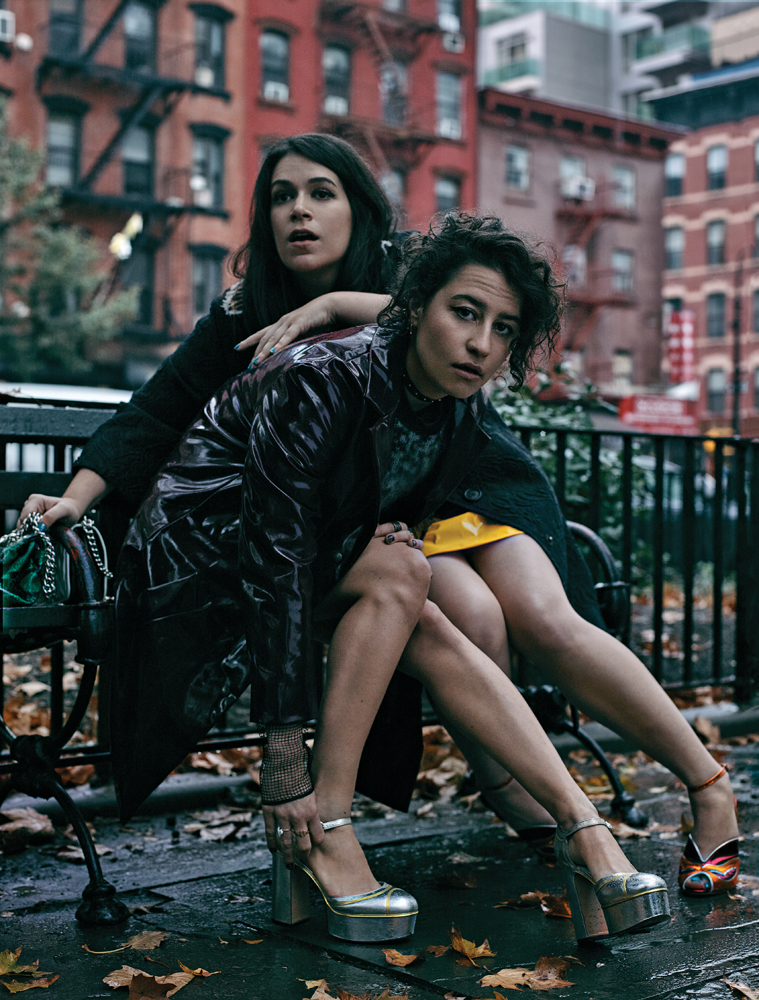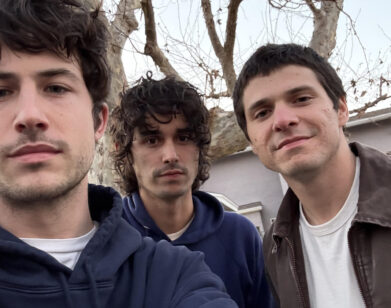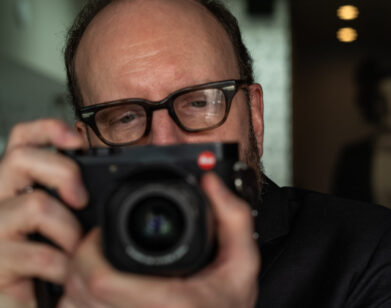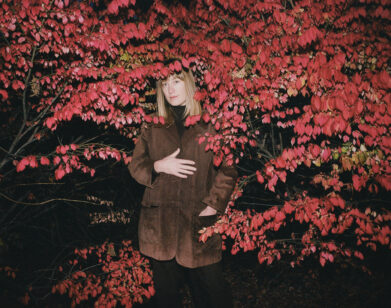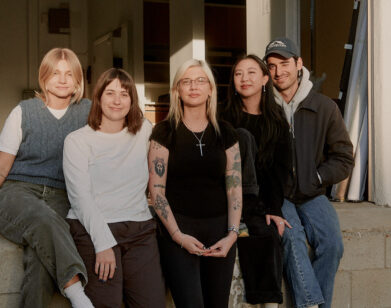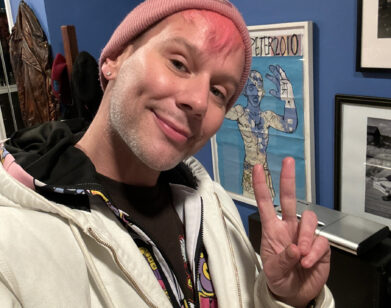Abbi JACOBSON & Ilana GLAZER
We’re not these experienced actors . . . Our room is full of young writers whose main credit is Broad City, but everybody truly gives the depth of their experience, like, ‘You want to hear my lowest New York moment?’â?? Ilana Glazer
As the characters Abbi and Ilana on Broad City, the Comedy Central show they created, Abbi Jacobson and Ilana Glazer play refracted and compounded versions of themselves that end up feeling at least a little bit like all our best friends, our family, ourselves. With their fellow writers, Jacobson and Glazer throw Abbi and Ilana into a series of all-too-familiar scenarios to tell weird, wonderful, and smackingly real stories about a couple of women and their set, about the city of New York, where they live and work—and about who and where we all are right now. It is a tribute to the spirit of the show that it can feel profoundly zeitgeisty without ever seeming overserious or even overambitious—only Broad City could make deep, cracking observations about millennials, about money, about sex and society and the patriarchy with the buoyancy of a dick joke (and actually make those observations with dick jokes). If Louie‘s New York is an autumnal, absurdist city out of Pinter or Arthur Miller, Jacobson and Glazer see the city in full spring—stinking of garbage here, scented with roses there; silly, broken, beautiful, and sometimes vividly surreal.
After meeting through the Upright Citizens Brigade improv comedy theater in New York, Jacobson, 32, and Glazer, 28, started making webisodes, performing their semiautobiographical characters in recognizably madcap situations. In short order, Amy Poehler took notice, and she helped Jacobson and Glazer bring their creation to Comedy Central, where the rest of us got to take notice. Two years later, as they celebrate this month’s premiere of their third season, with plans to make many more in the future, Jacobson and Glazer talked to one of their myriad superfans, the actress Ellen Page, about dealing with their success, balancing out their trippy visions, and finding some existential harmony.
ELLEN PAGE: I’m sort of delightfully nervous to talk to you. So forgive me for fangirling for a second. My girlfriend was the first one who was like, “You have to watch Broad City.” And needless to say, I’m blown away by both of you, and want to thank you for the joy that you bring to my life. No matter where we are—we can be stuck in traffic or just hanging out—my girlfriend and I will quote you. Out of nowhere one of us will yell, “I am not a mom!” It is infused into my daily life. So thank you. It seems like you came out of the womb funny. So when you’re an innately funny person growing up, is there a certain point where you’re like, “Oh, I’m funny, and I’m going to do something with this”? Or is it something you discover—from people telling you that you’re quick—and then that becomes a motivator in what you want to do and what you want to create?
ILANA GLAZER: You definitely have to know your strengths—especially if you’re a writer writing for yourself. I don’t know … It’s a crazy thing.
PAGE: When you were in high school, hanging out, were you like, “Oh, I’m funny”?
GLAZER: I think that was always my role, in my mind—like a social coping mechanism. I do think I’m funny but, like, stuff comes along with that—like needing people’s approval, hoping to make them laugh. There’s a pressure I think that comedians put on themselves before they even approach the industry. It is something I felt in myself or else I wouldn’t have pursued this project or pursued getting into the scene in the first place.
ABBI JACOBSON: I definitely started to perform a little bit in middle school, but not the typical musical/play route. I think that I am funny, but it was more of a social thing, where that was my part in my circle of friends. It was never a thing I thought could be a career. I never thought about that until I went to college and pushed my funny side away. I don’t think anyone I went to college with would ever have thought that I would do this later in life. But it was in college that I decided that I wanted to pursue acting.
GLAZER: My brother is also a comedian—he’s on the show, Eliot—and we used to make videos. My dad was so generous and not an uptight dad, giving us the video camera. And I was a musical theater nerd and in plays and shit.
JACOBSON: I definitely was obsessed with SNL.
GLAZER: I think it maybe it took longer for you to appoint yourself that funny person. I was unabashedly hungry for it.
PAGE: I’m really blown away by how you’ve managed to create a show exploring relatively mundane activity mixed with so much surreal texture—like the episode where you introduce Val [Abbi’s drunken alter ego on the show]. It’s like, I, as the audience member, feel similar to you, because you both feel like you’re experiencing this world in real time. Even though, obviously, it’s a premeditated piece. How do you do that?
JACOBSON: Well, thank you. We had a web series before the show for two years, where it was mostly about that mundaneness. A couple of them went into surreal territory, and that’s where we started with risk-taking. But when we moved into a longer format, it was like, “What kind of stories do we want to tell?” And it’s within the mundane stories that people fantasize the most. In college I used to drink more than I do now, and I would get blackout drunk once in a while, and my friend and I would call that version of myself Val. I did not sing like that. I did not do anything fun. It was just me being terribly drunk. But we were like, “We’ve got to do something with this. What would this be?” There are all these different steps in this process, and we’re sometimes not really sure when we’re in the script form if it is going to work, but it’s almost like, “It must.” Sometimes we get to the edits, and in the first cut it doesn’t work, and we are like, “Fuck, one-tenth of our show sucks.” And we have to figure out how to make it work. We have made 30 full, half-hour episodes, and we have 34 webisodes. It’s just through quantity that we’ve discovered the quality of the tone. So sometimes we’re both mundane; sometimes we’re both absurd. And I think the middle of the bell curve, the saddest part, is one of us doing one thing and one doing the other. It is a balance. I don’t want to be in some crazy world the whole time. Would Val work if we didn’t have Ilana being like, “What the fuck”?
PAGE: Ilana, that moment when you realize Abbi’s art show is at a café, you have this amazing moment where you’re like, “You have been busting my balls all day over a sandwich shop?” That’s a moment I’ll never forget. That’s the most simple but risky thing you could do, to say “sandwich shop” that way.
We both found ourselves in this spot where, when you want to make something like this, you have no other option but to go full-force or not at all. Abbi Jacobson
GLAZER: In acting, the riskiest part is when you make yourself vulnerable and make yourself available to the character. That’s one of the most valuable things on our show. We’re not these experienced actors; we don’t have many credits other than Broad City. And I was just thinking about this with our writers, too, because we just got this Writers Guild nomination, and our room is full of young writers whose main credit is Broad City, but everybody truly gives the depth of their experience, like, “You want to hear my lowest New York moment?” The audience feels that, and they know that Val comes from Abbi somewhere.
JACOBSON: I hope we have careers long beyond Broad City, but I don’t think there ever will be roles that are as unique for us, because it is a version of us. The sandwich shop, for example, couldn’t really be written for someone else.
GLAZER: We come from the New York comedy scene: improv, stand-up. We come from a place where it’s like, “What’s your voice? You, you, you.” And the New York comedy scene encourages people to be vulnerable. We also improv in the writers room.
PAGE: I am interested in what it means to sit down and write this show. Because a lot of people are having conversations about how the show explores identity politics, for example, or sex. And particularly your character, Ilana, having an intense love for Abbi—and, of course, the fantastic episode where you guys reference Blue Is the Warmest Color, with one of my favorite human beings, Alia Shawkat. Are you sitting down thinking about these things in our culture right now, about identity politics and how to infuse it all? Or is it more you’re just naturally telling stories and experiences you want to tell, and that’s leading others to have the conversation?
JACOBSON: I think it’s a little bit of both. We often love when people write reviews that are much smarter than what we thought we were doing. But I think we write about stuff that we think about ourselves as human beings living in the time we’re living in right now: what we’re thinking about with our family and friends that we want to talk about; what we would talk about, Ilana and I, and our other writers. So whenever we approach the other Abbi and Ilana, it always comes from us—rather than us thinking, “What do people want to see?”
GLAZER: Our awareness level of messaging versus straight pitching funny shit is admittedly changing as time goes on. It’s hard not to. We always want to come from a place that’s real. We want to come from a place of comedy: “What’s the funniest thing?” Real and comedy are almost the same priority, because they’re kind of synonymous. And it’s hard. It trips you up, that awareness. But it’s also necessary. I’m glad we think in those terms—sexual politics or whatever. That’s part of the show.
JACOBSON: But I will say it’s also based on what we think should be.
GLAZER: The reality we want to see on TV.
JACOBSON: Well, we as women are really—I hope—complicated and multifaceted; we have a lot of different parts of ourselves. And we have this very rare opportunity to show all of the things women could be. So why not do that?
PAGE: Totally. You’d think there’d be more of it. I get so excited when I watch your show, because the way you talk about sex is how I talk about sex with my friends. Which is very freely and very openly—what you’re thinking about, what happened, or what you want to happen. And in the episode, Abbi, where you go to the sex shop for the dildo, and we see Nicole trying to exchange the nipple clamps—that’s so genius. We’ve taken this person who we’ve seen in this other space, who we might have judgment about because of her attitude toward this character we love, and then we see her in this whole new space complaining about her nipple clamps.
GLAZER: If Ilana found that shit out, she would die. If Ilana found out that Nicole needs nipple clamps to cum, or whatever.
PAGE: Right. The nipple clamp represents something for all of us, you know? I wish I didn’t have to say this, but when you are two women, it is a pretty awesome thing to get to watch. And it’s so delightful and refreshing that none of it exists with any feeling of shame. I think a lot of people might censor that to a degree or think it’s not something to share. And you guys make that choice, and it seems like you do it very naturally. One of my absolute favorite episodes, which I’ve watched multiple times, is “The Last Supper.” I’m in pain when I watch it, physical pain because I laugh so hard. And then it ends with such tenderness. It’s so moving. I remember watching it and thinking, “This is done so well and shot so well.” Who directed this? And of course, it’s Amy Poehler.
GLAZER: Amy does push us to allow ourselves to be tender, and we’re always so grateful for that, because it’s something new for Comedy Central; it’s new for TV to see two women be tender and it not be about a guy, or at the end of a big fight. I’m so grateful for Amy for encouraging us to stretch our wings in that way.
JACOBSON: It was a big, amazing thing for Amy to direct the finale of our first season. I mean, I think up until maybe around now, where we feel a little more confident that we might get to make more episodes, during the first two seasons we really weren’t sure if we were going to get to do more. And even now, when we write, we write as if the finale could be the series finale. So for “The Last Supper,” we wanted to end with a really well-rounded episode, get every emotion in. And when Amy became involved in the project, it was so unreal. It was the biggest thing that had ever happened to both of us, and she was such an integral part of us expanding this world and our voices. So it was really a very full-circle moment.
GLAZER: It’s always, “What would Amy do?”
JACOBSON: “WWAD?”
PAGE: I think a lot of people are feeling that way with you guys. Despite the fact that in the show you play kind of relatively unmotivated people, you obviously worked really hard to be where you are right now. I think it can be really overwhelming for people who want to create something, whether it’s visual art or performance art or write a comedy or write a play or start a band. And I think you’re becoming an inspiration for a lot of people. I know it’s such a big question to ask, but what can you offer people in that sense? What enabled you to motivate yourselves to the degree that you’ve not only gotten to where you are but you created something so, so special?
JACOBSON: When we started making the web series, it came out of feeling very powerless in becoming what we wanted to become, not being able to get parts or get seen or heard as a performer or comedian. We both found ourselves in this spot where, when you want to make something like this, you have no other option but to go full-force or not at all. And that’s why we did it. It’s a weird thing. Energy can’t be created or destroyed, right? That energy must have been in us. You just have to gather it. That’s what agency is. Everybody has will—you just have to gather it. And I guess you choose where your inspiration comes from and give yourself that permission.
PAGE: And where does your inspiration come from? Abbi, you studied fine art, right?
JACOBSON: Yeah, I went to this school, called MICA, in Baltimore. My mom, my dad, and my brother are all visual artists. I think we’re both comedically inspired by a lot of sitcoms and shows that we watched growing up. Roseanne and Wanda Sykes and Whoopi Goldberg and Ellen.
GLAZER: Seinfeld.
JACOBSON: Larry David, yeah. But lately, weirdly, I’m most inspired by people. I’m really inspired by the power of the individual. People like Gloria Steinem. I don’t know. More than comedy, if that makes sense.
GLAZER: It’s also about getting a well-rounded pool of inspiration, like a body of inspiration. Just walking in New York City is so inspiring. For years most of my inspiration was just coming from my peers and people ahead of me. And going out every fucking night, seeing shows, improv, sketch, scripted. I’m spoiled in New York, but I like to see real people performing. We work in an industry where you’re working all the time. I like getting people who are not in the industry at all; hanging out with friends and just hearing their daily stuff. Stories about real people.
PAGE: Season 3 is coming soon, thank the Lord. Is there anything that changed from the process of writing the show?
JACOBSON: This season was without a doubt the most difficult to write. When we were writing season 2, season 1 was still airing, and we really didn’t have a break between editing season 1 and writing season 2. So we were really just in it, not getting any feedback and not even getting our own perspective on the show. For season 3, we had a lot of perspective, and it was very scary and hard, and it took us a little longer to get into it and figure out what we wanted to do. But I feel like we have a better hold on the series. And for us to be writing about ourselves, because it’s not us, it’s a very difficult thing to wrap your mind around sometimes.
GLAZER: Our lives are changing, and the characters also have to change. We were more conscious than ever this season that we were writing a show. It’s a third season, and there will probably be more. And figuring out the direction we want the show to go in, how we see the series ending, has clarified things. This was the hardest season to write, existentially. I feel like we were really DTR’ing [defining the relationship] this season, and that was just existentially heavy. I feel like we got over that hump, and it will be easier now that it’s caught up in our consciousness.
PAGE: But what does it mean now when you’ve gone through this shift of experience—how does that affect your relationship to people and New York City when now you walk around in the world and exist for others as Ilana and Abbi?
GLAZER: It definitely changes the sort of mundane story lines that we used to draw from. But it’s funny, in New York it’s not constant—the majority of people do not know who we are. We’re still living enough of these stories that could be translated to Abbi and Ilana on the show. There’s still a lot of observation on New York shittiness and wonderfulness that happens to us on a daily basis. But it’s definitely more complicated.
JACOBSON: I think we’ve made a very conscious choice to make New York—not to sound all Sex and the City—but the city is like a main character in the show. If you watch the show and you live in New York, you can relate to all the stuff. That’s the ultimate goal. And if you don’t live in New York, you’re like, “Holy shit, New York fucking sucks,” or, “New York can be beautiful sometimes.” But New York is such a part of your daily life when you live here; it can’t help but be infused in every part of your world.
GLAZER: And we are these suburban transplants. We didn’t grow up here. We came here thinking, “New York is so cool,” and we still feel that way. Our main writers live in L.A. now, and when they’re here, I feel like I have to apologize for how disgusting the city is—it’s fucking disgusting. It is a really hard place to live, even if you have money, even if you come from a place of privilege. It’s really hard no matter what. And it’s so visceral. It smells like shit. It looks beautiful, but then there are horrible things to look at. The sounds are so fucking annoying. It’s so easy to draw from. I don’t know … Somehow New York keeps you down. But in a way that’s good.
ELLEN PAGE IS AN INDEPENDENT SPIRIT AWARD-WINNING ACTOR WHO WILL STAR IN THE UPCOMING DRAMA INTO THE FOREST AND VICELAND’S LGBT DOCUSERIES GAYCATION.

